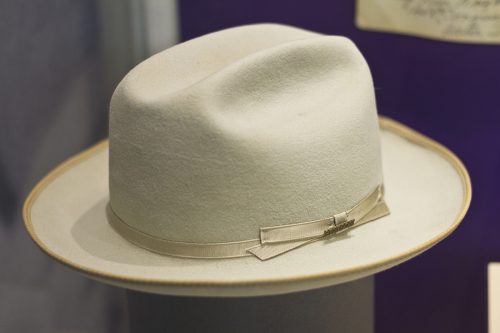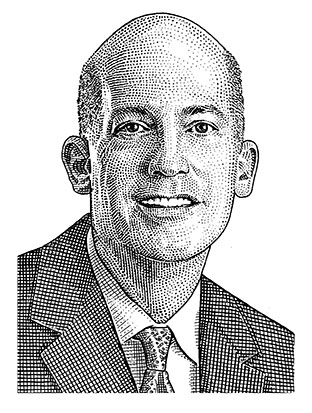Chancellor’s Letter: We’ve Got the Wright Stuff
Congressman Jim Wright’s papers are now part of Mary Couts Burnett Library’s Special Collections.
Chancellor’s Letter: We’ve Got the Wright Stuff
Congressman Jim Wright’s papers are now part of Mary Couts Burnett Library’s Special Collections.
The congressman’s Papers cast a valuable perspective on today’s world.

No Texas politician’s wardrobe was complete without a Stetson, including this one with Wright’s papers at TCU. Photo by Mark Graham
Maybe you’ve seen them in the Mary Couts Burnett Library: the Stetson hat, the boxing gloves, the boyhood drawings on yellowed paper. These items and a host of materials illustrate the life of longtime Fort Worth Congressman and former Speaker of the House Jim Wright.
“The People’s Congressman” represented Texas District 12 for more than 30 years and served as speaker from 1987 to 1989. Upon his resignation, Wright returned to Fort Worth and taught in TCU’s political science department. He maintained an office in the library until he died at age 92 in 2015.
Among the assets in the collection are videos of a five-minute television talk show Wright created in the late 1950s. One of his guests was then-Sen. John F. Kennedy, discussing Kennedy’s new book, Profiles in Courage (Harper & Row, 1955). Wright and JFK enjoyed a special rapport; years later Wright was part of the motorcade in Dallas when President Kennedy was assassinated. The collection features video of JFK’s final speech in Fort Worth, and a hauntingly sad memento: the president’s itinerary for the day.

Chancellor Victor J. Boschini, Jr.
Wright’s journals are among the effects, as well as a 1992 note to Newt Gingrich, who brought ethics charges against Wright in 1989 concerning profits from Wright’s book, Reflections of a Public Man (Madison Publishing, 1984). In elegant cursive writing, Wright extends an olive branch, forgiving Gingrich for “his trespasses” but asking Gingrich to apologize for calling Wright “a crook.” Gingrich’s respectful handwritten response is included.
I can’t help but reflect on how civil this exchange seems, though it occurred not that long ago. There is much to be learned from the Jim Wright Papers, and not all of it is scholarly. Perhaps looking back, we can learn ways to find common ground amid differing points of view. Civility is needed, now more than ever. I encourage you to explore these fascinating artifacts, which are so valuable to the university’s role as a marketplace of ideas and a powerful community for cultivating broader perspectives and ethical leaders.
Victor J. Boschini, Jr.
v.boschini@tcu.edu

Your comments are welcome
Comments
Related reading:
Features
Jim Wright Journals Offer Inside View of Political Life
In diaries left to TCU, the congressman talks politics and power.
Features
A Look Inside Special Collections
The library’s vault of historic writings and artifacts chronicles the history of TCU and Fort Worth.
Features
The New Mary Couts Burnett Library
The heart of TCU’s academic exploration has been reimagined for a new era.